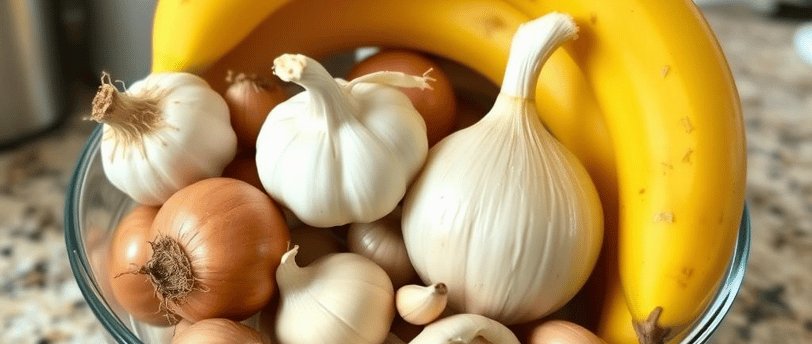Add Prebiotic Foods to Your Diet: Bananas, Garlic, Onions, and Asparagus Feed Good Gut Bacteria
🧘WELLNESS TIPS🌱 GUT HEALTH & DIGESTION


In recent years, the conversation around gut health has gained momentum, along with the understanding of the crucial role that the gut microbiome plays in our overall well-being. From improved digestion to enhanced immune function, a healthy gut is associated with a variety of positive health outcomes. One key aspect of nurturing this beneficial community of microorganisms within us is the inclusion of prebiotic foods in our diets. Prebiotic foods are non-digestible fibers that serve as food for the beneficial bacteria in our intestines. Notably, foods like bananas, garlic, onions, and asparagus have been lauded for their prebiotic properties, supported by compelling scientific evidence.
Understanding Prebiotics and the Gut Microbiome
Before diving into the specifics of these powerhouse foods, it’s essential to understand what prebiotics are and their significance in gut health. Prebiotics are a type of dietary fiber that the human body cannot digest. Unlike probiotics, which are live beneficial bacteria, prebiotics nourish the gut's existing healthy bacteria, promoting their growth and activity. When consumed, these fibers travel undigested into the colon, where they are fermented by the gut microbiota, producing short-chain fatty acids that are associated with various health benefits.
Scientific evidence suggests that a diverse gut microbiome is imperative for maintaining health. A balanced microbiome can help with digestion, synthesize essential vitamins, and even influence mood and mental health. Conversely, an imbalanced gut microbiome has been linked to conditions such as obesity, diabetes, irritable bowel syndrome, and even mental health disorders such as anxiety and depression.
The Prebiotic Power of Bananas
Bananas are not only a convenient and tasty snack but also packed with prebiotic fiber, particularly inulin and resistant starch. These fibers act as fuel for beneficial gut bacteria, promoting their growth. Research indicates that consuming bananas can improve gut microbiota composition and enhance digestive health.
In a study published in the journal Frontiers in Microbiology, researchers found that resistant starch from bananas fosters the growth of good bacteria, leading to improved gut health markers. Moreover, bananas are also rich in potassium and other vitamins, making them an ideal addition to a balanced diet. They can be consumed in various forms—raw, in smoothies, or even baked into nutritious treats.
Garlic: A Flavorful Gut Booster
Garlic is renowned not only for its distinctive flavor but also for its health benefits, particularly its prebiotic properties. Raw garlic contains a compound called inulin, which has been shown to stimulate the growth of beneficial bacteria in the gut. Additionally, garlic contains fructooligosaccharides (FOS), another type of prebiotic fiber that helps enhance the absorption of calcium and magnesium, contributing to overall gut health.
Scientific evidence from various studies, including one published in the journal Nutrition Reviews, has suggested that garlic can support the modulation of gut microbiota, promoting an increase in beneficial species like Bifidobacteria and Lactobacillus. Incorporating garlic into your diet can be simple—try adding it to savory dishes, soups, or even roasted vegetables for an added kick.
Onions: More Than Just a Cooking Staple
Like garlic, onions are an everyday kitchen staple that offer numerous health benefits. They are high in fructooligosaccharides, making them an excellent source of prebiotics. These compounds act as a food source for beneficial gut bacteria, promoting their growth and activity.
Research published in the Journal of Nutrition highlighted that consumption of onions can lead to an increase in beneficial gut bacteria, contributing to improved gut health and overall wellness. Onions are versatile and can easily be added to salads, stir-fries, and soups, making them an effortless way to boost your prebiotic intake.
Asparagus: A Nutrient-Packed Prebiotic Food
Asparagus is another powerhouse food when it comes to prebiotics. It is rich in inulin, which has been shown to improve gut health by encouraging the growth of beneficial gut bacteria. A study conducted by researchers from the University of Reading found that consuming asparagus increased the levels of bifidobacteria in the gut, which play a crucial role in digestive health.
In addition to its prebiotic properties, asparagus is a low-calorie vegetable packed with vitamins A, C, E, and K, as well as fiber. Including asparagus in your meals can be simple; grill it, roast it, or toss it in salads or stir-fries to enjoy its health benefits.
The Importance of a Balanced Diet
While adding prebiotic foods like bananas, garlic, onions, and asparagus can significantly support gut health, it is vital to view them as part of a broader dietary strategy. A diverse and balanced diet rich in various fruits, vegetables, whole grains, and lean proteins can help to maintain an optimal gut microbiome.
Moreover, while prebiotic foods are beneficial, they should also be consumed alongside a variety of probiotic sources, such as yogurt, kefir, and fermented vegetables. This combination facilitates a synergistic action, promoting the growth of beneficial bacteria while also introducing additional live microorganisms into the gut.
Conclusion
Incorporating prebiotic foods into your diet is a proactive step to support gut health and overall well-being. Scientific evidence underscores the benefits of embracing a diet rich in bananas, garlic, onions, and asparagus, highlighting their roles in fostering a healthy gut microbiome. As you explore these nutrient-dense foods, remember to maintain a diverse diet and listen to your body's needs. Whether you're looking to enhance your digestive health, boost immunity, or simply eat well, adding prebiotic foods to your meals can contribute to a happier, healthier you.
